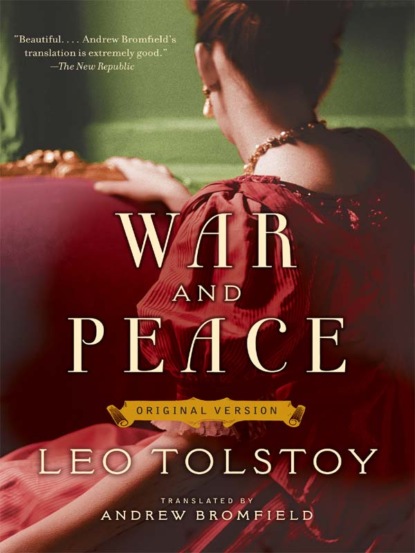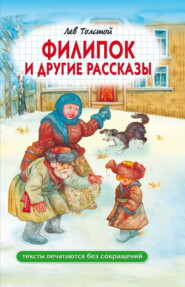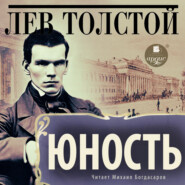По всем вопросам обращайтесь на: info@litportal.ru
(©) 2003-2025.
✖
War and Peace: Original Version
Автор
Год написания книги
2019
Настройки чтения
Размер шрифта
Высота строк
Поля
“But where have all these precautionary measures led us?” Anna Pavlovna persisted, refusing to give way.
“If nothing else, to discovering the opinion of that Austria of which you are so fond,” said Prince Vasily, clearly teasing Anna Pavlovna and not wishing to allow the tone of the conversation to move beyond the facetious.
But Anna Pavlovna had become heated.
“Oh, don’t you talk to me about Austria! Perhaps I don’t understand anything, but Austria does not want war and never has wanted it. She is betraying us. Russia alone must be the saviour of Europe. Our benefactor is aware of his high calling and he will be faithful to it. That is the one thing in which I believe. Our kind and wonderful sovereign is destined for the very greatest of roles in this world, and he is so virtuous and good, that God will not abandon him, and he will fulfil his calling to crush the hydra of revolution, which is more horrible than ever in the person of this assassin and villain. We alone must redeem the blood of the martyr. In whom can we place our hope, I ask you? England, with her commercial spirit, will not and cannot understand the lofty soul of Emperor Alexander. She has refused to evacuate Malta. She wishes to see, she seeks an ulterior motive in our actions. What did they say to Novosiltsev? Nothing. They did not understand, they cannot understand the selflessness of our Emperor, who wants nothing for himself but wishes everything possible for the good of the world. And what have they promised? Nothing. And even what they have promised will never be done! Prussia has already declared that Buonaparte is invincible and all of Europe is powerless against him … And I don’t believe a single word that Hardenberg or Haugwitz say … This vaunted Prussian neutrality is no more than a trap. I believe only in God and the exalted destiny of our dear Emperor. He will save Europe!” She stopped abruptly, with a mocking smile at her own vehemence.
“I think,” the prince said with a smile, “that if you had been sent instead of our dear Wintzengerode, you would have taken the Prussian king’s assent by storm. You are so eloquent. Are you going to give me tea?”
“In a moment. A propos,” she said, composing herself once again, “I have a most interesting person coming today, the Vicomte de Mortemart, he is related to the Montmorencys through the Rohans, one of the best families of France. He is one of the good émigrés, the real ones.
He behaved very well and has lost everything. He was with the Duc d’Enghien, with the hapless holy martyr while he was visiting Etenheim. They say he is quite a darling. Your charming son Hippolyte has promised to bring him here. All our ladies are quite beside themselves over him,” she added with a smile of disdain, as though she were sorry for the poor ladies who could think of nothing better to do than fall in love with the Vicomte de Mortemart.
“Apart from yourself, naturally,” said the prince in his gently mocking tone. “I have seen him in society, this vicomte,” he added, evidently little interested by the prospect of seeing Mortemart. “Tell me,” he said in a deliberately careless fashion, as if he had just remembered something, even though his enquiry was in fact the main purpose of his visit, “is it true that the Dowager Empress desires the appointment of Baron Funke as First Secretary in Vienna? It would appear that this baron is something of a nonentity.”
Prince Vasily wished to have his own son appointed to this position, which others were attempting to obtain for the baron through the Empress Maria Fedorovna.
Anna Pavlovna hooded her eyes almost completely in order to indicate that neither she, nor anyone else, could judge what was desirable or pleasing to the Empress.
“Baron Funke has been recommended to the Dowager Empress by her sister,” was all that she said, in a tone that was particularly aloof and melancholy. The moment Anna Pavlovna mentioned the Empress’s name, her face suddenly presented an expression of profound and sincere devotion and respect, combined with the sadness that she felt every time she mentioned her exalted patroness in conversation. She said Her Highness had been pleased to show great regard for Baron Funke, and once again her gaze was veiled with melancholy.
The prince lapsed into indifferent silence. Anna Pavlovna, with her characteristic courtly and feminine adroitness and prompt tact, felt a desire at once to tweak the prince’s nose for having ventured to speak in such a way about a person recommended to the Empress, and at the same time to console him.
“By the way, à propos your family,” she said, “did you know that your daughter is the delight of all society? They think her quite as lovely as the day. The Empress very often asks after her: ‘Where is my Belle Hélène?’”
The prince bowed in token of his respect and gratitude.
“I often think,” Anna Pavlovna continued after a moment’s silence, moving closer to the prince and smiling at him affectionately, as though indicating in this way that the conversation on politics and society was at an end, and the heart-to-heart talk was about to begin, “I often think how unfairly happiness is sometimes distributed in life. What have you done for fate to have given you two such marvellous children – excluding Anatole, your youngest, him I do not like,” she interjected categorically, raising her eyebrows. “Such charming children. And really, you appreciate them far less than anyone else, and therefore you do not deserve them.”
And she smiled her rapturous smile.
“Que voulez-vous? Lavater would have said I lack the bump of paternity,” said the prince listlessly.
“Stop your joking. I wanted to have a serious talk with you. You know, I am displeased with your younger son. I don’t know him at all, but he appears to have set himself out to earn a scandalous reputation. Just between ourselves” (her face assumed a melancholy expression) “he was spoken of at Her Majesty’s, and people feel sorry for you …”
The prince did not reply, but she gazed meaningfully at him in silence as she waited for a reply. Prince Vasily frowned.
“What would you have me do?” he said at last. “You know I have done everything that a father can for their education, and both of them have turned out fools. Hippolyte at least is a docile fool, but Anatole is a rowdy one. That is the only difference,” he said, smiling more unnaturally and animatedly than usual, and in so doing revealing with unusual distinctness something coarse and disagreeable in the folds that formed around his mouth, making Anna Pavlovna think it could not be very pleasant to be the son or daughter of such a father.
“And why do men like you have children? If you were not a father, there would be nothing I could reproach you with,” said Anna Pavlovna, raising her eyes thoughtfully.
“I am your devoted slave, and I can confess this only to you. My children are the bane of my existence. They are my cross. That is how I explain things to myself. What would you have me do?…” He fell silent, as a gesture of submission to a cruel fate. “Ah yes, if only one could choose to have them or not at will … I am certain that in our time such an invention will be made.”
Anna Pavlovna did not much like the idea of such an invention.
“You have never thought of marrying off your prodigal son Anatole. They do say that old maids have a mania for marrying people off. I am not yet aware of this weakness in myself, but I do have one little person who is very unhappy with her father, a kinswoman of ours, the Princess Bolkonskaya.”
Prince Vasily did not reply, although with the quickness of wit and memory natural to people of high society he indicated with a movement of his head that he had taken note of this information.
“Indeed, d’you know that this Anatole costs me forty thousand a year,” he said, evidently incapable of curbing his gloomy train of thought. He was silent for a moment.
“What will happen in five years’ time, if things carry on like this? Such are the rewards of being a father. Is she rich, your princess?”
“Her father is very rich and mean. He lives in the country. You know, the famous Prince Bolkonsky, retired from service under the deceased Emperor and nicknamed the King of Prussia. He’s a very intelligent man, but an eccentric and a difficult character. The poor girl is so unhappy. She has a brother, he’s the one who recently married Lise Meinen, and is now Kutuzov’s adjutant, he lives here and will be coming this evening. She is the only daughter.”
“Listen, ma chère Annette,” said the prince, suddenly catching hold of the other person’s hand and for some reason tugging it downwards. “Arrange this business for me and I shall be your most devoted slave for ever. She comes from a good family and is rich. That is all I require.”
And with those free and familiar, graceful movements that were so characteristic of him, he raised the lady-in-waiting’s hand and kissed it, and having kissed it he waved the hand through the air as he sprawled back in his armchair, gazing away to the side.
“Attendez,” said Anna Pavlovna, pondering. “I will have a word today with Lise, young Bolkonsky’s wife. And maybe it will all be settled. I shall begin to study my trade as an old maid with your family.”
II
Anna Pavlovna’s drawing room began filling up little by little. The highest nobility of St. Petersburg arrived, people who differed greatly in age and character, but were alike in terms of the society in which they all lived: the diplomat Count Z. arrived, covered in stars and decorations from all the foreign courts, then came the Princess L., a fading beauty, the wife of an envoy; a decrepit general entered, clattering his sabre and wheezing; then Prince Vasily’s daughter, the beautiful Hélène, entered, having called to collect her father in order to go on with him to the ambassador’s festivities. She was wearing a ball gown and her insigne as a lady-in-waiting. The young little Princess Bolkonskaya, known as the most enchanting woman in St. Petersburg, also arrived; she had married the previous winter and now no longer appeared at great society events on account of being pregnant, but she still went out to small soirées.
“You have not yet met …” or “I don’t think you know my aunt …” said Anna Pavlovna to each of her guests as they arrived, leading them across with great seriousness to a little old woman with tall bows on her cap who had come gliding out of the next room as soon as the guests had begun to arrive; she introduced each by name, slowly shifting her gaze from guest to aunt, before moving aside. All of the guests performed the ritual of greeting this aunt who was known to no one, in whom no one was interested and whom no one wanted to meet. Anna Pavlovna followed their greetings with sad, solemn concern, tacitly giving approval. In speaking to each of them the aunt used the same expressions, whether they concerned the guest’s health, her own health or the health of Her Majesty, which today, thank God, was improved. Concealing their haste out of a sense of decorum, all who approached the old woman left with a feeling of relief at an onerous duty fulfilled, never to approach her again for the entire evening. Of the ten or so gentlemen and ladies already present, some were gathered by the tea table, some were in the nook behind the trellis, and some by the window: all of them made conversation and moved freely about from one group to another.
The young Princess Bolkonskaya arrived with her needlework in a velvet bag embroidered in gold. Her pretty little upper lip with its faint hint of a dark moustache was too short to cover her teeth, but it opened all the more sweetly for that and occasionally stretched down more sweetly still to touch her lower lip. As is always the case with thoroughly attractive women, her fault – the shortness of her upper lip and her half-open mouth – seemed to be her special, very own beauty. Everyone was gladdened by the sight of this pretty mother-to-be so full of health and vitality, who bore her condition so lightly. Just looking at her, being with her and talking for a while made old men as well as bored, sullen young men feel as though they themselves were growing like her. Anyone who spoke with her and saw the radiant smile that accompanied her every word and the brilliant white teeth that were constantly visible, thought he was especially charming that day. Every one of them thought so. Waddling with short, quick steps, the little princess moved round the table with her needlework bag hanging from her arm and, adjusting her dress, sat herself down happily on the divan beside the silver samovar, as though whatever she did was amusing to herself and to everyone around her.
“I’ve brought along my work,” she said, opening the top of her reticule and addressing everybody at once.
“Now, Annette, don’t you play any nasty tricks on me,” she said, addressing the hostess. “You wrote that you were only having a little soirée, and see how poorly dressed I am.” And she spread out her arms to show off her elegant grey gown trimmed with lace and girdled with a broad ribbon under the bosom.
“Don’t you worry, Lise, you will always be the loveliest of all,” replied Anna Pavlovna.
“You know, my husband is abandoning me, he’s going off to get himself killed,” she continued in the same tone, addressing the general. “Tell me, whatever is the point of this loathsome war?” she asked, turning to Prince Vasily and, without waiting for a reply, turned to Prince Vasily’s daughter, the beautiful Hélène: “You know, Hélène, you are becoming too lovely, just too lovely.”
“What a delightful creature this little princess is!” Prince Vasily said quietly to Anna Pavlovna.
“Your charming son Hippolyte is madly in love with her.”
“The fool has taste.”
Shortly after the little princess entered, a stout young man with short-cropped hair came in, wearing spectacles, light-coloured knee-breeches after the fashion of the time, a high ruffle and brown tailcoat. Despite the fashionable cut of his clothes, this fat young man was clumsy and awkward, in the way that healthy peasant lads are clumsy and awkward. But he was unembarrassed and resolute in his movements. He halted for a moment in the centre of the drawing room and, failing to locate the hostess, bowed to everyone except her, despite the signs she was making to him. Taking the old aunt for Anna Pavlovna herself, he sat down beside her and began speaking, but finally realising from the aunt’s astonished face that this was not the right thing to do, he stood up and said:
THE LITTLE PRINCESS Drawing by M.S. Bashilov, 1866 (#ulink_b53453fd-4238-5cc4-bccc-6e68205fc837)
“I beg your pardon, mademoiselle, I thought you weren’t you.”
Even the impassive aunt blushed at these senseless words and waved with a despairing expression to her niece, beckoning for help. Anna Pavlovna left the other guest with whom she was occupied and came across.
“It’s so very good of you, Monsieur Pierre, to come to visit a poor invalid,” she said to him, smiling and exchanging glances with her aunt.
Pierre then did something even worse. He sat down beside Anna Pavlovna with the expression of a man who intended to stay for some time and immediately started talking about Rousseau, of whom they had spoken at their last meeting but one. Anna Pavlovna had no time for this. She was busy listening, watching, arranging and rearranging her guests.
“I cannot understand why,” said the young man, peering significantly at his interlocutress over the top of his spectacles, “everyone so dislikes The Confessions, when the Nouvelle Héloïse is far more inferior.”
The fat young man expressed his meaning awkwardly, challenging Anna Pavlovna to an argument and completely failing to notice that the lady-in-waiting had absolutely no interest whatever in which work was good or bad, especially now, when she had so many other things to think of and remember.

















